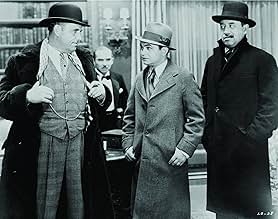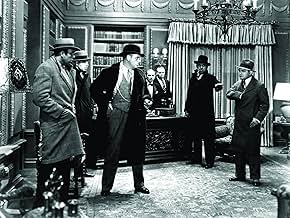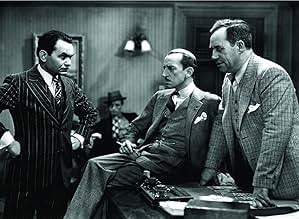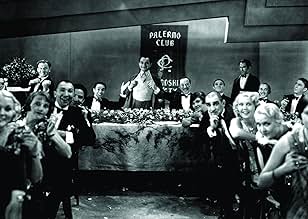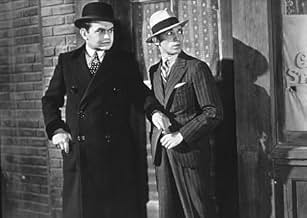NOTE IMDb
7,2/10
15 k
MA NOTE
Un petit truand déménage dans une grande ville pour tenter sa chance.Un petit truand déménage dans une grande ville pour tenter sa chance.Un petit truand déménage dans une grande ville pour tenter sa chance.
- Réalisation
- Scénario
- Casting principal
- Nommé pour 1 Oscar
- 2 victoires et 1 nomination au total
Thomas E. Jackson
- Sgt. Flaherty
- (as Thomas Jackson)
Nicholas Bela
- Ritz Colonna
- (as Nick Bela)
Ernie Adams
- Cashier
- (non crédité)
Elmer Ballard
- Bat Carilla
- (non crédité)
Ferike Boros
- Mrs. Passa
- (non crédité)
Kernan Cripps
- Detective
- (non crédité)
George Daly
- Machine-Gunner
- (non crédité)
Adolph Faylauer
- New Year's Celebrant
- (non crédité)
Avis à la une
Edward G. Robinson's memorable performance in "Little Caesar" is rightfully one of his best-remembered roles. While he deserves also to be remembered for his versatility in many other performances as well, it's easy to see why this one in particular is still remembered. Along with James Cagney's role in "The Public Enemy", Robinson's portrayal here helped to exemplify the kinds of characters that for some time defined the genre.
The story is not without interest in itself, as it follows the rise and decline of various gangsters and their followers. The fragile nature of their form of 'power' comes across quite clearly, and of course there is plenty of action as well. It's not especially subtle, but it wasn't supposed to be. The supporting cast all give solid performances, but Robinson's character is always the center of attention. Douglas Fairbanks, Jr. has the most interesting character to work with among the supporting roles.
The story moves at a good pace, especially given its release date, and is over almost before you know it. Even aside from Robinson, it's one of the better features of the earliest years of sound movies, handling the dialogue and sound better than most. Like "The Public Enemy", it was set in its own time, but it's a good production overall that still works rather well decades later.
The story is not without interest in itself, as it follows the rise and decline of various gangsters and their followers. The fragile nature of their form of 'power' comes across quite clearly, and of course there is plenty of action as well. It's not especially subtle, but it wasn't supposed to be. The supporting cast all give solid performances, but Robinson's character is always the center of attention. Douglas Fairbanks, Jr. has the most interesting character to work with among the supporting roles.
The story moves at a good pace, especially given its release date, and is over almost before you know it. Even aside from Robinson, it's one of the better features of the earliest years of sound movies, handling the dialogue and sound better than most. Like "The Public Enemy", it was set in its own time, but it's a good production overall that still works rather well decades later.
Boy, is this gangster movie dated but Edward G. Robinson makes it so entertaining! Robinson, like James Cagney, can dominate a film. He certainly does that in this movie, and is sure fun to watch as "Enrico Bandello."
Everything about the movie, including the DVD transfer (although a lot better than the VHS) is dated-looking and sounding, but that helps make it interesting. The dialog is so passe that it's almost weird. I put on the English subtitles so I could understand everything because the slang of those days is something foreign to us nowadays. The different expressions of the day are fun to hear (and read).
The acting by the man (Thomas Jackson?) who plays the main cop is also strange, very wooden-like. He just didn't sound natural. Some of the other actors were likewise, others were fine. It was one of the early "talkies" so maybe things were still needed to be smoothed out, film-wise and acting-wise. In other words, some of the actors sounded professional and others amateurish.
The following year, James Cagney's "Public Enemy" came out and was much better, production-wise. What a big difference in the camera-work, for one. This film may not be the caliber of "Public Enemy" but it's still good and one to have in your collection.
Everything about the movie, including the DVD transfer (although a lot better than the VHS) is dated-looking and sounding, but that helps make it interesting. The dialog is so passe that it's almost weird. I put on the English subtitles so I could understand everything because the slang of those days is something foreign to us nowadays. The different expressions of the day are fun to hear (and read).
The acting by the man (Thomas Jackson?) who plays the main cop is also strange, very wooden-like. He just didn't sound natural. Some of the other actors were likewise, others were fine. It was one of the early "talkies" so maybe things were still needed to be smoothed out, film-wise and acting-wise. In other words, some of the actors sounded professional and others amateurish.
The following year, James Cagney's "Public Enemy" came out and was much better, production-wise. What a big difference in the camera-work, for one. This film may not be the caliber of "Public Enemy" but it's still good and one to have in your collection.
Little Caesar which popularized both the gangster film and Edward G. Robinson is a great study in the criminal mindset and the ruthlessness it takes to get to the top of that world. After all in White Heat look at the epitaph James Cagney gave to his career.
We meet Robinson and a friend Douglas Fairbanks, Jr. in some greasy spoon in the middle of nowhere. Fairbanks wants to go into dancing, but Robinson knows exactly what he wants. He wants to rise to the top of the criminal world. Not for riches or fame, but simply raw naked power. As he says to have a bunch of guys working for you who will do ANYTHING you say. The more men you have doing that, the more powerful you are.
And the film is a study in the rise and fall of Robinson in his chosen field. But the top is a lonely place.
It's been said there's an undercurrent of homosexuality running in Little Caesar between Robinson and Fairbanks by some critics. I've never subscribed to that point of view. In doing what he's doing Robinson essentially cuts himself off from all kind of human contact. His only other attachment is the fawning George E. Stone from his gang.
Robinson needs Fairbanks as a friend and confidante. We all need that, someone we can unbend with and show our true feelings, even if it's confiding our criminal ambitions.
But as the plot develops Fairbanks who's been on the fringe of Robinson's activities, meets Glenda Farrell and they fall in love. And through her partially Fairbanks develops a conscience about what he's seen.
How Robinson deals with it and what becomes of everyone involved is for those interested in viewing the film. But after over 70 years, Little Caesar holds up very well because of its universal theme.
Loneliness at the top is an occupational hazard for all ambitious people. It's never expressed in such raw terms as in the gangster film genre. But it's still used. Used in fact in both the Paul Muni version of Scarface and in Al Pacino's version as well.
Mervyn LeRoy did a fine job in directing this groundbreaking piece of entertainment. Robinson's portrayal once seen is never forgotten.
We meet Robinson and a friend Douglas Fairbanks, Jr. in some greasy spoon in the middle of nowhere. Fairbanks wants to go into dancing, but Robinson knows exactly what he wants. He wants to rise to the top of the criminal world. Not for riches or fame, but simply raw naked power. As he says to have a bunch of guys working for you who will do ANYTHING you say. The more men you have doing that, the more powerful you are.
And the film is a study in the rise and fall of Robinson in his chosen field. But the top is a lonely place.
It's been said there's an undercurrent of homosexuality running in Little Caesar between Robinson and Fairbanks by some critics. I've never subscribed to that point of view. In doing what he's doing Robinson essentially cuts himself off from all kind of human contact. His only other attachment is the fawning George E. Stone from his gang.
Robinson needs Fairbanks as a friend and confidante. We all need that, someone we can unbend with and show our true feelings, even if it's confiding our criminal ambitions.
But as the plot develops Fairbanks who's been on the fringe of Robinson's activities, meets Glenda Farrell and they fall in love. And through her partially Fairbanks develops a conscience about what he's seen.
How Robinson deals with it and what becomes of everyone involved is for those interested in viewing the film. But after over 70 years, Little Caesar holds up very well because of its universal theme.
Loneliness at the top is an occupational hazard for all ambitious people. It's never expressed in such raw terms as in the gangster film genre. But it's still used. Used in fact in both the Paul Muni version of Scarface and in Al Pacino's version as well.
Mervyn LeRoy did a fine job in directing this groundbreaking piece of entertainment. Robinson's portrayal once seen is never forgotten.
Seminal gangster film about the rise and fall of Enrico Bandello, a Chicago hoodlum, based on the novel by W.R. Burnett. The prototype for Enrico was, like so many other gangster heroes, mobster Al Capone. If you know a little bit about his life story, you got your basic gangster plot for practically all films that followed, like Tony Camonte in SCARFACE.
This film was the first of "the big three", together with PUBLIC ENEMY (1931) and SCARFACE: SHAME OF THE NATION (1932) and provided the blueprint for the modern gangster crime flic. It was the first gangster film to reach a wide audience and launched Edward G. Robinson to stardom. The story is simple and straightforward and might feel a little overly familiar to modern audiences, but the film lost little of its power and still holds up pretty well. It's a tough movie, but mostly tough talking with not much violence on screen.
But the film would probably be instantly forgettable without Robinson's superb performance. Whenever he's on screen, his presence is incredibly menacing. The rest of the cast is so so, but Thomas Jackson as Flaherty, Rico's nemesis, gives a wonderfully cynical performance, mocking Rico and all the other gangsters. Like most other early gangster films, it lacks the real emotional depth and complexity that came with later films, like the French gangster films of the fifties or THE GODFATHER and was made primarily as popular entertainment. Pleasant entertainment nevertheless with Edward G. Robinson portraying the first classic gangster role in screen history.
Camera Obscura --- 8/10
This film was the first of "the big three", together with PUBLIC ENEMY (1931) and SCARFACE: SHAME OF THE NATION (1932) and provided the blueprint for the modern gangster crime flic. It was the first gangster film to reach a wide audience and launched Edward G. Robinson to stardom. The story is simple and straightforward and might feel a little overly familiar to modern audiences, but the film lost little of its power and still holds up pretty well. It's a tough movie, but mostly tough talking with not much violence on screen.
But the film would probably be instantly forgettable without Robinson's superb performance. Whenever he's on screen, his presence is incredibly menacing. The rest of the cast is so so, but Thomas Jackson as Flaherty, Rico's nemesis, gives a wonderfully cynical performance, mocking Rico and all the other gangsters. Like most other early gangster films, it lacks the real emotional depth and complexity that came with later films, like the French gangster films of the fifties or THE GODFATHER and was made primarily as popular entertainment. Pleasant entertainment nevertheless with Edward G. Robinson portraying the first classic gangster role in screen history.
Camera Obscura --- 8/10
LITTLE CAESAR was made at a critical time in U.S. history. Prohibition was in, the depression was overwhelming, and mobsters were running rampant. I don't think the filmmakers realized it, but they have made a movie that paints the "Mafia" as glamorous and flashy. A message appears before the flick, telling the public how "we" must stop gangsters like Tom Powers (James Cagney,PUBLIC ENEMY) and Rico, (Edward G. Robinson, LITTLE CAESAR). The movie probably had youngsters and adults alike wanting to live the life of a man who had a city in his grasp, and no one who was anyone was "yellow". All seriousness aside, this blueprint of a long history of mob pictures is silly, dated, and damn watchable. You can't take your eyes off the screen.
A film with dialogue like the ultimate cliche "Go on. I'm...done for" must be a waste of time right? Not if you appreciate pre-historic cinema and the Vitaphone films of the early talkie period. Actors like the great Edward G. Robinson were born to talk and deliver lines at machine gun pace. This is what the audiences of the time were looking for. And that mug. Audiences would not see such a face on a gangster until Brando's GODFATHER. If you love GOODFELLAS, THE GODFATHER, Cagney and Bogart films, and even PULP FICTION, this is a must see. Experience an American original - the first potent "La Cosa Nostra" movie. Rat tat tat tat tat!!!
RATING: 10 of 10
A film with dialogue like the ultimate cliche "Go on. I'm...done for" must be a waste of time right? Not if you appreciate pre-historic cinema and the Vitaphone films of the early talkie period. Actors like the great Edward G. Robinson were born to talk and deliver lines at machine gun pace. This is what the audiences of the time were looking for. And that mug. Audiences would not see such a face on a gangster until Brando's GODFATHER. If you love GOODFELLAS, THE GODFATHER, Cagney and Bogart films, and even PULP FICTION, this is a must see. Experience an American original - the first potent "La Cosa Nostra" movie. Rat tat tat tat tat!!!
RATING: 10 of 10
Le saviez-vous
- GaffesRico is hit by the bullet sufficiently to require bandaging by Scabby, but the overcoat he was wearing has no bullet hole in it, nor is there any trace of blood in the subsequent scene in Little Arnie's office.
- Citations
[last lines]
Caesar Enrico Bandello: Mother of Mercy! Is this the end of Rico?
- Versions alternativesIn the 1954 re-release, a foreword crawl was added, warning that the "heroes" of Little Caesar and L'ennemi public (1931) represent "a problem that sooner or later we, the public, must solve." This version is often shown on cable channels.
- ConnexionsFeatured in Hollywood: The Fabulous Era (1962)
Meilleurs choix
Connectez-vous pour évaluer et suivre la liste de favoris afin de recevoir des recommandations personnalisées
- How long is Little Caesar?Alimenté par Alexa
Détails
- Date de sortie
- Pays d’origine
- Langue
- Aussi connu sous le nom de
- Little Caesar
- Lieux de tournage
- Société de production
- Voir plus de crédits d'entreprise sur IMDbPro
- Durée
- 1h 19min(79 min)
- Couleur
Contribuer à cette page
Suggérer une modification ou ajouter du contenu manquant



